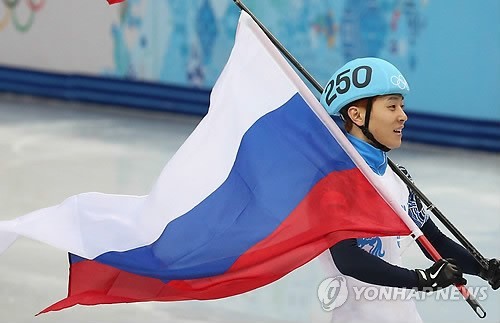
Viktor Ahn, hailed as a national hero in Russia after winning three gold medals at the Sochi Winter Olympics, is being called Кореец, or Koryo-in (ethnic Koreans), by his adopted country, a local media outlet reported.
Ahn is making headlines in Russia after his stunning performance at the Olympics, with the Russian press including the state-run news agency RIA Novosti using the term “Koryo-in” when referring to him, according to news website Newsroh.
Koryo-in is the term used for ethnic Koreans in the post-Soviet states who migrated to Russia from the years of 918 to 1,392. Some 300,000 ethnic Koreans are said to reside in Russia.
Russians, calling Ahn “Our Koryo-in,” are viewed as showing their love for Ahn and willingness to embrace him as part of their society.
The Olympic champion gained explosive popularity in Russia for earning the Olympic host nation three gold medals, in the 500- and 1,000-meter individual events and the 5,000-meter relay. In the 1,500 meter, the only other men’s event, he won a bronze medal.
As he mounted the top of the medal podium, the mostly Russian crowd waved flags, cheered for their adopted star and chanted his first name.
“Russians are familiar with ethnically minor Koryo-in, so they did not have hostile feeling for Ahn from the beginning,” Kim Won-il, president of Moscow Association of Korean Residents, was quoted as saying.
Earlier, the news that Ahn is still living in athletes’ village without a home in Moscow reportedly stirred public sentiments and led Prime Minister Dmitry Medvedev to order the sports minister to present Ahn with an apartment in the nation’s capital.
Ahn will allegedly reap financial rewards worth $400,000, with $110,000 per gold and $48,000 for bronze combined from the Russian government. It has also been reported that he is receiving a flood of sponsorships from Russian companies and guaranteed a position as a national team coach after the Olympics ends.
The 28-year-old gold medalist, who earned three gold medals at the 2006 Olympics for his birth country Korea, decided to switch allegiances to Russia in 2011 after failing to make the Korean national team for the 2010 Vancouver Olympics.
By Ock Hyun-ju, Intern reporter (laeticia.ock@heraldcorp.com)








![[Graphic News] More Koreans say they plan long-distance trips this year](http://res.heraldm.com/phpwas/restmb_idxmake.php?idx=644&simg=/content/image/2024/04/17/20240417050828_0.gif&u=)
![[KH Explains] Hyundai's full hybrid edge to pay off amid slow transition to pure EVs](http://res.heraldm.com/phpwas/restmb_idxmake.php?idx=644&simg=/content/image/2024/04/18/20240418050645_0.jpg&u=20240419100350)





![[From the Scene] Monks, Buddhists hail return of remains of Buddhas](http://res.heraldm.com/phpwas/restmb_idxmake.php?idx=652&simg=/content/image/2024/04/19/20240419050617_0.jpg&u=20240419175937)

![[KH Explains] Hyundai's full hybrid edge to pay off amid slow transition to pure EVs](http://res.heraldm.com/phpwas/restmb_idxmake.php?idx=652&simg=/content/image/2024/04/18/20240418050645_0.jpg&u=20240419100350)

![[Today’s K-pop] Illit drops debut single remix](http://res.heraldm.com/phpwas/restmb_idxmake.php?idx=642&simg=/content/image/2024/04/19/20240419050612_0.jpg&u=)